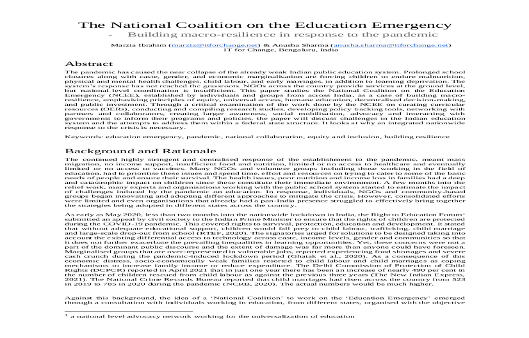The Indian public education system has been severely impacted by the COVID-19 pandemic, leading to prolonged school closures and exacerbating existing inequalities. The National Coalition on the Education Emergency (NCEE) was formed to address these challenges through coordinated national-level efforts. This paper examines the NCEE's work in curating educational resources, conducting research, policy tracking, networking, awareness creation, advocacy, and engagement with governments. The paper emphasizes the need for an integrated nationwide response to the crisis, focusing on equity, universal access, decentralized decision-making, and public investment.
Key Points:
- The pandemic has caused significant disruptions in the Indian public education system, leading to learning deprivation and socio-economic challenges for children, including malnutrition, child labor, and early marriages.
- NGOs have provided grassroots-level support, but national-level coordination is lacking.
- The NCEE was established as a response to the crisis, aiming to build macro-resilience through collaboration, research, and advocacy.
- The NCEE focuses on curating curricular resources, conducting research, policy tracking, networking, and awareness creation.
- Challenges in the Indian education system are analyzed within a federal state structure, emphasizing the need for an integrated nationwide response.
- The paper explores the impact of the pandemic on educational exclusion and holistic child development using the concepts of "zones of exclusion" and Bronfenbrenner's ecological systems theory.
- The NCEE's efforts address the challenges by promoting equity, inclusive education, and community support.
- Policy measures and initiatives by the Indian government are evaluated, highlighting the limitations of remote learning and the importance of decentralized decision-making.
- The NCEE advocates for safe school reopenings, provision of meals, and addressing malnutrition issues.
This Research Paper can be accessed here.

